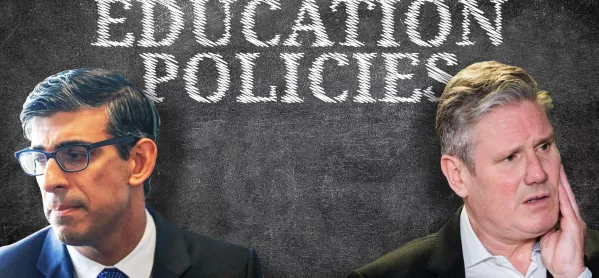Why have we heard so few education policy pledges?

With somewhere between a year and 18 months to go before the next election, Westminster has already swung into campaign mode.
We’ve seen proposals and counter-proposals from the Conservatives and Labour on crime, immigration and childcare, among other things.
Some of these ideas may not be very edifying or practical but at least they’re being talked about.
The sound of silence
Schools, on the other hand, have barely featured as yet - beyond prime minister Rishi Sunak’s plans (I use plans in a loose sense) for maths to be taught to all beyond 16.
This could be seen as a blessing, after the upheavals of recent years, the last thing schools need is another revolution or reorganisation. But it’s concerning for two reasons.
First because, whoever wins the election, it will be followed by an intense battle for limited resources across the public sector. If schools aren’t front of mind, they may get left out.
Secondly, there are a set of serious challenges that, in our highly centralised system, cannot be resolved with government involvement.
Look at what these challenges are, though, and it’s clear why politicians don’t want to talk about them.
Long-term problems being ignored
The first set can be grouped into the category of “fixing the basics”. We don’t have enough teachers applying for initial teacher training and we’re losing too many experienced professionals.
The physical estate is crumbling, with the Department for Education considering it “highly likely” that buildings will start collapsing. An increasing number of children are living in deep poverty, leaving schools having to feed and support them without the means to do so. Camhs has collapsed.
The problem here is that resolving any of these issues costs money. There’s no free way to rebuild a school.
Teacher pay has become uncompetitive with other graduate jobs. Reducing poverty means scrapping welfare restrictions like the benefits cap.
But as neither Labour nor Conservatives want to admit the tax burden will have to increase further after the election, they have to pretend none of these things are necessary.
Little incentive for arcane policy discussions
That leaves them talking about policies that cost little or no money. This is relatively easy when it comes to topics like immigration and crime because you can get plentiful newspaper coverage from promising “crackdowns” and “tough new rules”.
It’s somewhat harder when it comes to public service reform. The education topics that parties could talk about without big financial pledges - like assessment, accountability and curriculum - are technically complex and politically tricky.
There is much frustration in the sector, and that has broken through into the wider media. Labour has offered some tweaks around the presentation of information. But the real problem is that our entire regulatory model is built on the use of Ofsted inspection outcomes.
The only way to really reduce the pressure of inspections would be to overhaul the regulation of academy trusts. As the government found with their failed Bill last summer, though, this is no easy task. Moreover, it’s hardly a voter-friendly topic.
There’s no incentive for politicians to start talking about important but arcane-sounding policies at this stage of the electoral cycle.
Assessment and curriculum might seem like more promising options. And we have seen a bit of proposed fiddling around the edges, with Sunak’s maths plan and some minor suggestions from Labour around curriculum additions.
But there is little appetite for anything more substantive. The government are happy with the status quo and is focusing, in its final year, on attempting to embed T levels as a post-16 qualification.
Labour is split between two groups. The traditionalists, who, more or less, support what the Conservatives have done over the past few years and worry about “progressive” backsliding.
And those who, like Labour leader Keir Starmer aide and former School 21 headteacher, Peter Hyman, want to see an overhaul of, what they see as, a stale and outdated approach to “standards”. The shadow education team can’t say much without causing a row that, again, is not helpful in the run-up to an election.
Muddling on
It’s hard to believe schools won’t feature at all in the long campaign. Starmer is due to make a speech in the coming weeks on his “opportunity” mission, which may offer some clues as to where Labour might focus its efforts.
The Conservatives might broaden their maths plans into proposals to reform post-16 academic education more comprehensively.
But, at the moment, it all looks pretty thin and uninspiring. Until we’re through the election, schools may find themselves having to muddle along without much direction.
Something they are getting sadly used to.
Sam Freedman is a senior fellow at the Institute for Government and a former senior policy adviser at the Department for Education.
Sam will be one of the speakers at the upcoming Schools and Academies Show in London. Tes are media partner for the event. Find out more and register for free by visiting the Schools and Academies Show website
Register with Tes and you can read two free articles every month plus you'll have access to our range of award-winning newsletters.
Keep reading with our special offer!
You’ve reached your limit of free articles this month.
- Unlimited access to all Tes magazine content
- Save your favourite articles and gift them to your colleagues
- Exclusive subscriber-only stories
- Over 200,000 archived articles
- Unlimited access to all Tes magazine content
- Save your favourite articles and gift them to your colleagues
- Exclusive subscriber-only stories
- Over 200,000 archived articles
topics in this article



